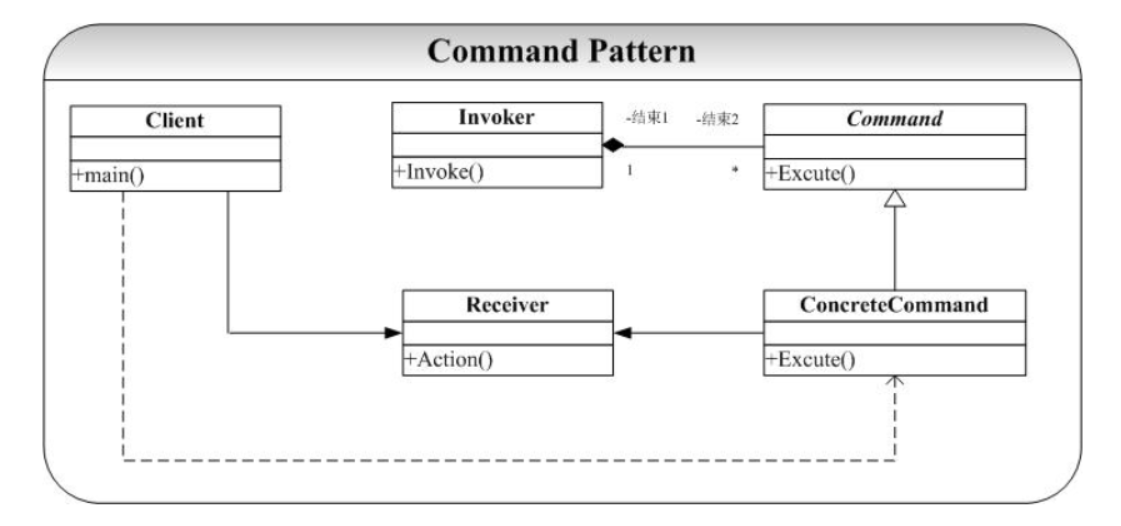行为型 - 命令模式(Command)
Command 模式通过将请求封装到一个对象( Command) 中,并将请求的接受者存放到具体的 ConcreteCommand 类中( Receiver) 中, 从而实现调用操作的对象和操作的具体实现者之间的解耦。
[[toc]]
概念
Command 模式典型的结构图为:

Command 模式结构图中,将请求的接收者(处理者)放到 Command 的具体子类ConcreteCommand 中,当请求到来时( Invoker 发出 Invoke 消息激活 Command 对象),ConcreteCommand 将处理请求交给 Receiver 对象进行处理。
备注:这里的Invoke 消息就是下面Notify()来处理的。
代码实现
模型代码实现
#ifndef _RECIEVER_H_
#define _RECIEVER_H_
class Reciever
{
public:
Reciever();
~Reciever();
void Action();
protected:
private:
};
#endif //~_RECIEVER_H_
#include "Reciever.h"
#include <iostream>
Reciever::Reciever()
{
}
Reciever::~Reciever()
{
}
void Reciever::Action()
{
std::cout << "Reciever action......." << std::endl;
}
#ifndef _COMMAND_H_
#define _COMMAND_H_
#include <iostream>
using namespace std;
class Reciever;
class Command
{
public:
virtual ~Command();
virtual void Excute() = 0;
protected:
Command();
private:
};
class ConcreteCommandA : public Command
{
public:
ConcreteCommandA(Reciever *rev);
~ConcreteCommandA();
void Excute();
protected:
private:
Reciever *_rev;
};
class ConcreteCommandB : public Command
{
public:
ConcreteCommandB(Reciever *rev);
~ConcreteCommandB();
void Excute();
protected:
private:
Reciever *_rev;
};
#endif //~_COMMAND_H_
#include "Command.h"
#include "Reciever.h"
Command::Command()
{
}
Command::~Command()
{
}
void Command::Excute()
{
}
ConcreteCommandA::ConcreteCommandA(Reciever *rev)
{
this->_rev = rev;
}
ConcreteCommandA::~ConcreteCommandA()
{
}
void ConcreteCommandA::Excute()
{
cout << "ConcreteCommandA Excute" << endl;
_rev->Action();
}
ConcreteCommandB::ConcreteCommandB(Reciever *rev)
{
this->_rev = rev;
}
ConcreteCommandB::~ConcreteCommandB()
{
}
void ConcreteCommandB::Excute()
{
cout << "ConcreteCommandB Excute" << endl;
_rev->Action();
}
#ifndef _INVOKER_H_
#define _INVOKER_H_
#include <vector>
#include <iostream>
using namespace std;
class Command;
class Invoker
{
public:
Invoker(Command *cmd);
Invoker();
~Invoker();
void Add(Command *cmd);
void Remove(Command *cmd);
void RemoveAll();
void Notify();
protected:
private:
Command *_cmd;
vector<Command *> _commands;
};
#endif //~_INVOKER_H_
#include "Invoke.h"
#include "Command.h"
Invoker::Invoker(Command *cmd) : _cmd(cmd)
{
}
Invoker::Invoker()
{
}
Invoker::~Invoker()
{
delete _cmd;
}
void Invoker::Add(Command *cmd)
{
_commands.push_back(cmd);
}
void Invoker::Remove(Command *cmd)
{
for (std::vector<Command *>::iterator iter = _commands.begin(); iter != _commands.end(); )
{
if (*iter == cmd)
{
iter =_commands.erase(iter);
}
else
{
iter++;
}
}
}
void Invoker::RemoveAll()
{
_commands.clear();
}
void Invoker::Notify()
{
std::vector<Command *>::iterator it = _commands.begin();
for (; it != _commands.end(); ++it)
{
_cmd = *it;
_cmd->Excute();
}
}
#include "Reciever.h"
#include "Invoke.h"
#include "Command.h"
int main(int argc, char *argv[])
{
Reciever *pstReceiver = new Reciever();
Command *pstConcreteCommandA = new ConcreteCommandA(pstReceiver);
Command *pstConcreteCommandB = new ConcreteCommandB(pstReceiver);
Invoker *pstInvoke = new Invoker();
pstInvoke->Add(pstConcreteCommandA);
pstInvoke->Add(pstConcreteCommandA);
pstInvoke->Add(pstConcreteCommandB);
pstInvoke->Notify();
cout << "------------------" << endl;
pstInvoke->Remove(pstConcreteCommandA); //撤销操作
// pstInvoke->Remove(pstConcreteCommandB);
pstInvoke->Notify();
cout << "------------------" << endl;
return 0;
}
上述例子中
void Add(Command *cmd);//添加命令
void Remove(Command *cmd);//删除命令
void RemoveAll();//删除全部命令
void Notify();//通知执行所有命令
[root@VM-16-6-centos Command]# ./CommandTest
ConcreteCommandA Excute
Reciever action.......
ConcreteCommandA Excute
Reciever action.......
ConcreteCommandB Excute
Reciever action.......
------------------
ConcreteCommandB Excute
Reciever action.......
------------------
